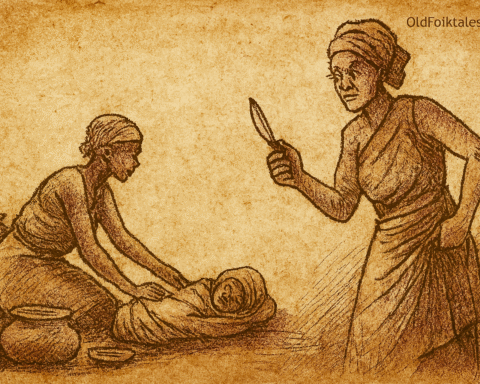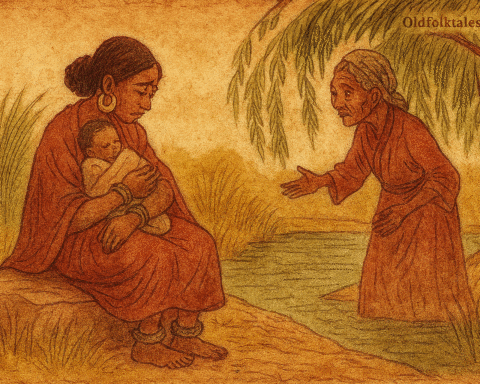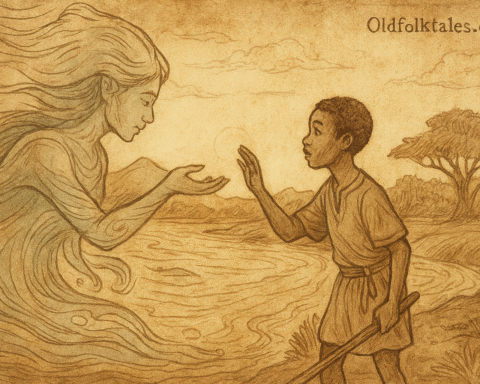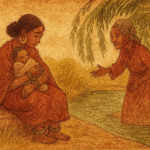Long ago, before the rivers carved their paths and the clouds learned to gather, the land of the Venda people was quiet during the dry months. The soil cracked, the leaves withered, and even the great Limpopo River seemed to whisper instead of roar. In those times, there lived a small, plain bird with no special song. It hopped from branch to branch, searching for food, and no one paid much attention to it.
The animals of the bush had their gifts. The lion had his roar, the guinea fowl had her chattering call, and the hornbill had a deep echoing cry. But the little brown bird remained silent. When the dry season came, the elders of the land would call to the spirits of the clouds, asking them to send rain. The clouds listened to the thunder, to the drums, and to the prayers, but they never listened to the little brown bird.
One year, the drought was harsher than any before. The rivers shrank into thin streams, the cattle grew thin, and the people’s grain stores emptied. The village called a great meeting. “We must send a messenger to the Spirit of Rain,” the chief declared. “Only one who can reach the highest mountain and cross the Valley of Winds will survive the journey.” Many animals were named. The eagle refused because he feared the lightning. The jackal declined because he loved the dry season’s hunting.
The small bird stepped forward. “I will go,” it said softly. The other animals laughed. “You cannot even sing,” the guinea fowl mocked. “How will the Spirit of Rain notice you?” But the little bird did not turn back. That night, it began its journey toward the far mountains where the Spirit of Rain was said to dwell.
Days turned into weeks. The bird crossed thorny thickets, flew through storms of dust, and braved the Valley of Winds. It grew weaker with each day, yet it pushed forward. Finally, it reached the sacred waterfall that marked the home of the Spirit of Rain. The waterfall was dry, its rocks bare. Above it stood a tall figure made of mist and silver light.
“Why have you come?” the Spirit asked in a voice like distant thunder.
The little bird bowed its head. “The people and animals are thirsty. The land is dying. I came to beg you to send rain.”
The Spirit of Rain looked at the bird with pity. “I cannot hear you well,” it said. “Your voice is too small. If you wish for me to hear your call each time your people need rain, you must first give something of yourself.”
The bird trembled. “What can I give?”
“Give me your voice,” the Spirit replied. “I will shape it into a call that will reach me wherever I am. But you will only sing for rain, and never for yourself.”
The little bird agreed without hesitation. The Spirit touched the bird’s throat, and warmth spread through its body. The bird opened its beak, and a strange, haunting call filled the air. It was unlike any other bird’s song. It rose like mist, fell like raindrops, and echoed across valleys. The Spirit of Rain smiled and said, “Go home. When your people hear your call, they will know the rain is coming.”
The bird flew back to the village. On its way, clouds gathered above, and the first drops of rain fell. The people danced, the cattle drank, and the earth turned dark with moisture. From that day on, whenever the land grows dry and the bird calls, the people know that rain is on its way. They named it the Rainbird, keeper of the promise between sky and earth.
Moral Lesson
The tale of How the Rainbird Got Its Call teaches that even the smallest and most overlooked among us can carry great responsibility when driven by courage and selflessness. True greatness is not found in power or beauty but in the willingness to sacrifice for the good of others. The Rainbird’s gift was born from humility and determination, showing that every voice, no matter how small, can bring change when it speaks for the well being of the community.
Knowledge Check
- What is the origin of the folktale How the Rainbird Got Its Call?
It comes from the Venda people of South Africa and explains how the Rainbird received its special voice. - Why did the little bird volunteer to speak to the Spirit of Rain?
The bird volunteered because the land was suffering from a terrible drought and no other animal was willing to go. - What challenge did the little bird face on its journey?
The bird crossed thorny thickets, dust storms, and the dangerous Valley of Winds to reach the Spirit of Rain. - What sacrifice did the bird make to gain its call?
The bird gave its voice to the Spirit of Rain, who transformed it into a special song used only to call for rain. - What does the Rainbird’s call signal to the Venda people?
It signals that rain is coming and the long dry season will soon end. - What is the main lesson from the Rainbird folktale?
The main lesson is that courage, humility, and selflessness can make even the smallest voice powerful enough to bring change.
Cultural Origin
This folktale belongs to the Venda people of South Africa, who live mainly in the northern part of the country near the Limpopo River. Their oral traditions often weave nature, animals, and spiritual forces into stories that teach moral lessons and explain the natural world.






